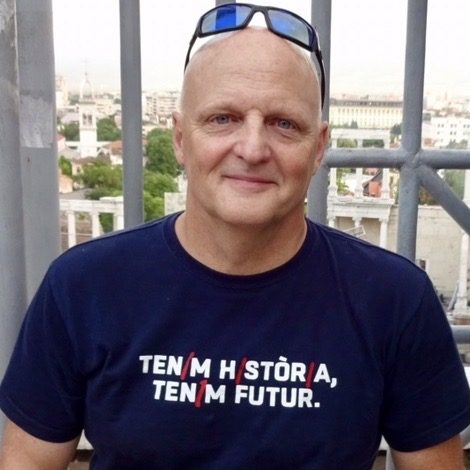Last night I went out with friends and had a wonderful conversation about what constitutes the “Good Life.” This came on the heels of a marathon discussion, a few days earlier, with my three adult children and several of their friends on the same subject.
Only kidding.
In point of fact, I cannot remember the last discussion I had with anyone about how we should define and pursue the Good Life. Needless to say, I have not seen the issue raised in our media in any serious way for several decades now. When we consider that addressing this question has been one of the mainstays of Western intellectual life for more than 2,500 years, its generalized absence from our public is, in my view, alarming.
To discuss the best way to pursue a quality life is, in the most basic sense, to swear fealty to the idea that human beings, unlike most of our fellow animals, have not only the ability but also the responsibility, to alter their inner lives and the social reality around them in ways that will create a greater sense of peace and satisfaction for all.
It also implicitly affirms the existence of pre-existing virtues inherent in the design of creation, that if discovered during our trial-and-error march through life, or are gifted to our consciousness by the exemplarity of others, can bring much calm and joy to the often terrifying experience of being alive.
You would think that in times like our own, with so much in flux, we’d be witnessing a veritable renaissance of discussions about the nature of the good life in every corner of our culture. But that’s clearly not the case.
I believe the answer can be found, as is so often the case, in the trajectory of our culture’s guiding ideas. More than perhaps any culture in the world, the US was forged in the glow of modernity, which is to say, the movement that, at the turn of the 15th and 16th centuries in Europe, began to posit that mankind had greatly underestimated its ability to engender positive changes within the stunning beauty, complexity, and tragedy of the world bequeathed to it by its creator.
And as the material progress of the ensuing centuries suggests, they were clearly onto something. There was, indeed, a much greater margin for the human-driven manipulation of the self and the environment than their medieval predecessors had ever imagined.
The key word here is margin. Few if any of the early Moderns believed it was possible or desirable to dispense with the concept of a Nature or an Almighty whose parameters and complexities, they believed, were far beyond the conceptual ken of the human mind. They knew there was a tension inherent in the ways they were pushing back the frontiers of the possible in relation to nature and thus generally brought a palpable sense of humility to their endeavors.
Things have changed dramatically in this realm within the last hundred or so years.
Epistemologies are theoretical frames that we place “on top” of the vastness of reality to render it more comprehensible to our necessarily limited intellects. We do this in the belief that by separating the extraneous from the essential we can better focus on the key elements of the particular inquiry at hand.
Often left unsaid or unrecognized is the fact that every decision to leave something “outside” a particular epistemological frame rests on the often culturally engendered a priori logics of the authorities or experts bent on establishing its parameters.
For example, while a practitioner of Traditional Chinese Medicine sees ensuring the most unimpeded and internally balanced flow of energies in the body as lying at the very heart of the healing enterprise (with cholesterol levels and other blood tests as perhaps useful adjuncts), his Western counterpart cares virtually nothing about such things, and when asked about them, often maligns them (more than a thousand years of positive empirical results be damned) them as primitive and useless superstitions.
As the material and scientific progressed fairly steadily in the Western world over the course of the five centuries following the advent of modernity many thinkers and doers began to lose their consciousness of the essentially constructed nature of their way of framing their inquiries into the nature of the world.
Not encouraged by the institutions within which they were educated and generally work to adopt a meta-critical approach to their activities, they quite often came to see their gaze upon reality the realities they study not as the heavily mediated one that it is, but rather as completely direct, natural, and universal in nature.
Indeed, as a professor at a small college, where the dialogue between scholars from different disciplines is generally greater than it would be at a large university, I would often challenge my colleagues in both the hard and the soft sciences to reflect upon how the epistemological traditions of their particular disciplines might be blinding them to realities of potential value to their search for truth. More often than not, my questions were met with blank stares; most of them truly believed they were looking at the objects of their study in a largely, if not completely, direct and unmediated fashion.
If their reactions were representative of the general outlook of our culture’s educated classes today, and sadly I think they are, then we find ourselves in a very interesting, and for me, frightening place.
We now have a credentialed elite that has largely dispensed with the first Moderns’ deep consciousness of the limitations of their movement’s key critical paradigms and replaced it with a blind faith in those same paradigms’ capacity to provide them objective, omniscient, and totalizing views of any and all parts of the world around us, including the minds of their fellow citizens.
Mystery? Beauty? Awe? Wonder? Serendipity?…and all those other emotions and sensations that have guided the mind of human beings inexorably toward the contemplation of transcendent forces and their presumably vast powers for millennia?
No, in this new world, none of those things are relevant. The only remaining mystery, our educated visionaries tell us repeatedly in large and small ways, is just how long it will take for them to map it, and lock it all down under their, of course, benevolent control.
What’s this got to do with the search to define, create, and live the Good Life?
Well, insofar as we buy into their plans, we are, in effect, assuming the role of permanent passengers on their train of alleged linear progress and betterment. And while traveling on trains occasionally can be very pleasant, riding on them each and every day severely limits one’s ability to both experience and act upon the world in a broadly conceived manner. Over time, we become numb to the landscapes passing by the window and tend to sink into and accept, foreshortened visions of what is possible for each of us to be, to do, and even think.
In assuming this life posture we essentially obliterate the need for discussions on what constitutes the Good Life.
Why? Because, as everyone who has been baptized into, and worships at, the Church of Inexorable Progress knows, human betterment will always be out there in our future. It’s simply a matter of placing our faith in the all-seeing experts.
So strong is this faith in the power of newness brought to us by supposedly enlightened people that healthy majorities of the culture have learned, in a desperate effort to preserve their belief in the system, to completely repudiate their own ability to reason on the basis of their own sensorial and intellectual inputs. This is, in many ways, the greatest of the many triumphs that the self-appointed expert class achieved through their imposition of the Covid operation.
-“Take the vaccine to stop the spread!”
-It has been proven that the vaccines don’t stop the spread and hurt people!”
-Still, I’m glad I took it, as it would have been worse!”
Is there any way other than as a sign of our slavish obeisance to the cult of the new and improved to explain the fact that it has taken us nearly 20 years to begin a discussion about whether it is a good idea to allow kids to have smartphones in school? Was it really that difficult to foresee that a combination TV, radio, telephone camera, and computer complete with infinite channels of porn in the hands of every student might exactly improve the academic environment? Hell, I held off getting one because I was afraid of what it might do to middle-aged brain. But when it came to our kids it was damn the torpedoes because, as they say, “You can’t stop progress.”
It’s too bad that so few of these new legions of faith-based deniers of empirical truths have thought much about how ideas and paradigms inevitably mutate over time.
Rational modernity arose as a response to a medieval world that had inordinately curtailed man’s in-built desire to look critically at the world and act upon it according to his own insights. The effects of this movement to afford human volition and the human intellect a much greater role in the configuration of our individual and collective human destinies produced many positive things.
However, in terms of this paradigm’s continued ability to deliver palpable improvements to the great majority of the people, it seems we have long since entered into the realm of rapidly diminishing returns. From the massively hyped (the vaccines) to the seemingly trivial (restaurant codes by QR code only) the examples of the non-improvement, and often frank deterioration, of life quality through the top-down imposition of “forward-looking” technologies are legion.
Do we have the courage to admit this and to begin saying “no” to the empty promises of liberation through “progress” that are forced upon us daily?
Or will we, in the way of a friend with whom I shared my first bracing and liberating drinks of alcohol, continue, out of learned compulsion to, in effect, knock ‘em back with abandon to the detriment of his now aged body, long after the thrill he and I originally experienced from those gulps we shared at age fourteen is gone?
Published under a Creative Commons Attribution 4.0 International License
For reprints, please set the canonical link back to the original Brownstone Institute Article and Author.



